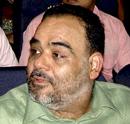
New Delhi, November 17: Controversial liquor baron Ponty Chadha and his brother were killed when both sides opened fire at each other during a meeting to find a resolution to their ongoing property dispute in a farmhouse in south Delhi today.
55-year-old Ponty and his brother Hardeep, with whom he had a strained relationship due to property dispute, were shot at in their chests during the meeting at the former's farmhouse in Chhattarpur at around one pm, police said.
The meeting was called to resolve the dispute over ownership of some property and it started on a peaceful note but it soon turned ugly following which Hardeep allegedly opened fire at his brother, sources said.
This enraged the guards of Ponty who returned the fire in which Hardeep was killed.
However, there was also another version which said both Hardeep and Ponty, whose real name is Gurpreet Chadha, opened fire at each other and their guards also joined in the firing.
Both the brothers were rushed to AIIMS but were declared dead at arrival by doctors. Ponty is believed to have taken six bullets on his body.
This is the second incident of firing at Ponty Chadha's residence. On October five, firing took place at his ancestral home in Moradabad.
Chadha's business empire encompasses distilleries, multiplexes, sugar and paper mills, real estate, poultry and films. He was producer of the Sunny Deol starrer 'Jo Bole So Nihaal'.
Chadha, who is considered close to UP politicians, is one of the prominent names in liquor business in Uttar Pradesh and was granted the sole distributorship for liquor.
Forensic and crime teams rushed to the spot and have lifted finger prints and other evidences from the spot. Empty cartridges have also been recovered.
Ponty Chadha had hit the headlines earlier this year when the I-T department conducted searches at his premises in February covering 13 locations in Delhi, including the posh Sainik Farms, Lajpat Nagar, New Friends Colony, and in six locations in Noida, Moradabad and Lucknow.





Comments
Add new comment